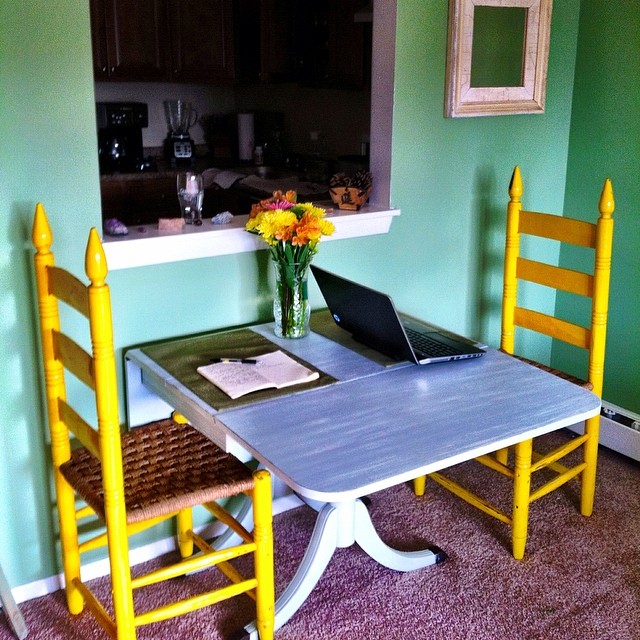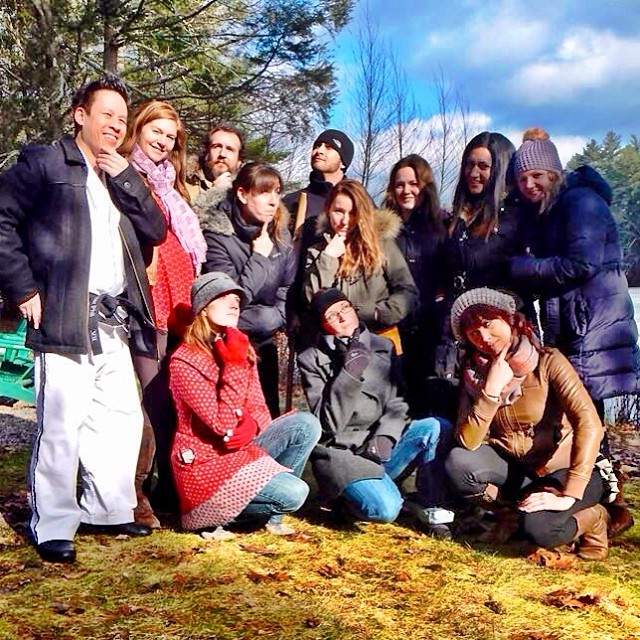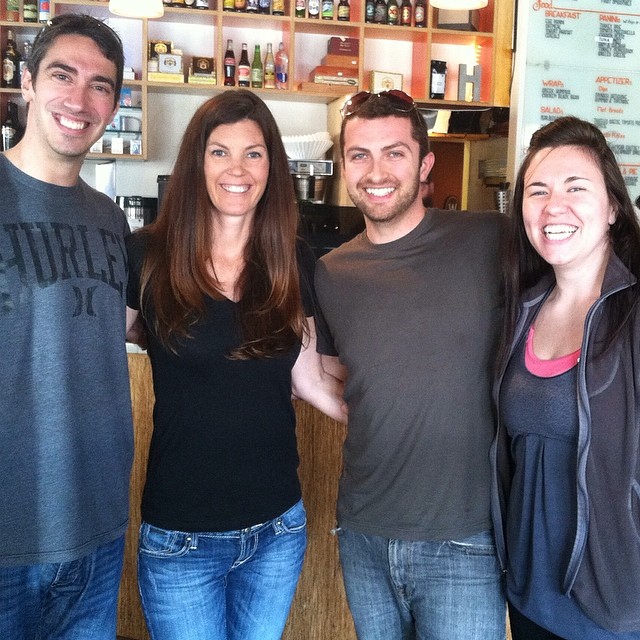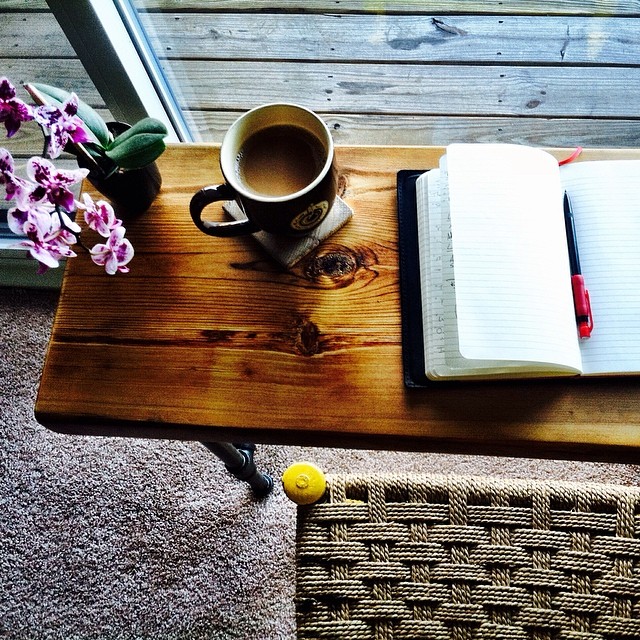I feel very lucky to do the work that I do in my life, and one of the things that I enjoy the most is helping people put action to their dreams. Projects like my online writers’ group, The Literati Writers, has brought 80 amazing people from 7 countries to my doorstep for just that reason.
What I never realized was that the common theme of my work would become: help these writers actually write.
Since August 2012 when my writers’ group was founded, I’ve learned that the single biggest struggle that writers deal with is actually writing.
It doesn’t matter if you’re dreaming of starting a book or quitting your job–whether you have plans to get coffee with a friend or take a call in the office that you really don’t want to take. The toughest part is showing up. We’d rather avoid it than confront it, because confronting it means facing the unknown and owning it from that point after.
Sitting down and “just doing it” is, for every writer, artist, entrepreneur or human being the exact same mammoth task.
If that’s the case, what follows is, unfortunately, an overly simplistic solution: if showing up is the hardest part, find a million different strategies to help you “show up” and do it.
It does seems like a simple enough solution.
This is why most of the advice we see and scoop up and share online is strategy and “how-to.” We’ve become so strategy-obsessed in our instantaneous online world–wrongly assuming that strategy is what separates us from achieving our dreams. So we eat up blog post after blog post about “The X Steps to Do Y” and obsess over how to “hack” everything from breakfast to a book outline.
With the sheer number of “X Ways to Accomplish Y” advice that’s out there today, one has to wonder, why is it that anyone still struggles to write, create, produce or accomplish… anything?
It’s because strategy doesn’t define success or failure.
So what does?
Your environment, your people, and your daily practices.
The conditions that surround you define your success or failure, just as much as your personal dedication and skill-based ability to achieve your dreams.
I’m talking about all the obvious factors that affect you on the day-to-day: relationships, free time, physical space, emotional space, even a clear understanding of why you wish to self-express at your core.
Yes, each one of these can either make your writing easier, or a lot more difficult.
And yet, my advice here isn’t about “minimizing” or removing “all of the things” from your plate.
Too many assume that the existence of outside factors means they’ll struggle to achieve anything, when in fact, you can actually align and integrate these various aspects of your life to help you achieve your goals.
There are three steps that you can take on any given day, week or month that, altogether, can help you begin to align all of the different pieces of your life into place to help support you, your dreams and your desires–whether those goals are artistic, business, financial or personal.
How are the conditions of your life supporting or hurting your goals?
I break down the most important conditions into three categories: your living environment, the people around you, and your daily practices.
A 3 Step-Process for Becoming a Better Writer, Entrepreneur or Human Being
Step 1.) Reshape your environment.
We all know the saying, “You’re a product of your environment.” Your environment can quite literally nourish you, or begin to slowly suffocate you. No writer, artist or entrepreneur will turn their dreams into reality by hoping to discover little moments and 5 minute breaks in between her schedule.
You need to actively cultivate the time and space that you require.
Start by reshaping your living and working environments. Begin by examining your physical surroundings, and think about your emotional space, too.
Do you have a designated creative space that is purely your own? Do you have a writing desk in your favorite window? A corner of your studio designated for your art? What is the physical space where you do your creating? Beyond physical space, do you have enough emotional space on any given day to sit down and create? Or are you endlessly “on the go” and rushing through two pages of To Do lists?

I’ve turned my brand new apartment into it’s own creative studio. It’s both calming in color and design, with splashes of color that inspire my creative side. On an emotional level, I have the time and space here to create at-will.
And, I tend to personally find that the morning is the most “open” feeling time of day to create–waking early to create feels peaceful and allows me to dig deep into my thoughts. Here’s my designated writing desk that’s situated in my living room window–I write here every morning:
What does your ideal environment feel like when you imagine it?
Is it a physical space? Is it an emotional space?
Where do the two cross, and what does it look like?
Step 2.) Surround yourself with the right people.
We’re a product of our environment, and we’re also a product of the company we keep.
You don’t need to have everyone in your life fully understand and support your creative desires, but having some semblance of a support system that you can turn to is absolutely pivotal.
A support system of peers, friends, a writers’ group or something like a yoga community is a designated safe space. These peers help you escape from the questioning and doubting that goes on our own minds. Among people who share our values, goals and dreams, we find a natural sense of understanding, togetherness and peace–with them, and within ourselves. There’s no need to defend ourselves or explain our actions.
We can just act. Create. Write. Because we feel called to. And all without judgment.
This principle is the foundation for all of my projects, including The Literati Writers, The U Crew, my workshops and my Weekend in the Woods writing and yoga retreat this past January:

So my friend, does anyone know that you write, sing, dance, dream of starting a business or launching a startup?
Does anyone know what your dreams and goals are–besides yourself?
Why are you hiding from them?
Who is that “one person” who seems to have always “gotten you” who you can reach out to and chat with?

And, tell me, what would it feel like to have a supportive community around you that you could rely upon for input, accountability, guidance, and pats on the back?
What would it feel like to have a group of peers who understand you on a soul-level? What values, beliefs and ideas would they share with you? What would that group encourage you to do that you’re not doing already?
Step 3.) Set a manageable daily (or semi-daily) practice.
If the single biggest struggle that writers deal with is actually writing, eventually, we need to start to put the skill of writing into action.
Whether you’re a painter or a yogi or looking to quit your career and start a new business, eventually, you have to put your belief into practice. Philosophy, dreaming or belief alone really isn’t worth a damn if we don’t begin to integrate, align, and turn the intangible into tangible, physical realities.

That’s where we see magic happen, lives change and the fabric of the world around us shifts.
I don’t believe in militant daily practices–I usually side with listening to yourself rather than over-willing yourself into action, but that may be because after 5 years of spending a whole lot of time with myself I’ve become acutely aware of my needs in any given moment.
What I do encourage is that you test some personal practices that you can develop into daily or semi-daily habits to give yourself a genuine opportunity to experience them, and witness your changes.
You might try one or two of these at any given time (not all at once–give yourself the time and space to feel their effect):
- Writing 500 words a day
- Going to yoga 3-4 times per week
- Meditating every morning for 10-15 minutes
- Scheduling one phone call with a friend every day
- Green juicing every morning
- Reading for 20 minutes before bed every night
What personal practices and habits do you enjoy?
I’d love to know!
Come on over and join our community, The U Crew, on Facebook. Say hello and tell us about what practices have and haven’t worked for you.
Did you find this advice helpful? You can learn more smart and helpful creative practices by joining me me at ALIVE in Berlin this May 30-31, 2014.
Putting skill into action is a discipline that demands not only a responsibility to oneself and one’s dreams, but a deep and committed responsibility to others around us (families, friends, coworkers), and responsibility to all of the tasks, obligations, and other very important things going on in our lives.
In other words, the dream to “just get some writing done” quietly demands an extraordinary amount of commitment–not just to writing or your projects, but to your life, to yourself, and to everyone around you.
That’s why I do what I do–from retreats to workshops and traveling abroad.
This May, I’m honored to be teaching a workshop on this very subject at ALIVE in Berlin, a conference that unites like-minded people in a supportive space where we’ll be exploring the philosophy and personal practices to help us become more alive throughout all aspects of our lives.
Attending a conference like this is a great way to commit to yourself on a deep level, while forging personal connections to peers and finding an environment that helps you achieve your dreams.
I would love to see you there.
Tickets are still available, and if you come to my workshop, coffee is on me :)
Learn more about ALIVE in Berlin by listening to my recent interview with founder Jana Schuberth:
[soundcloud url=”https://api.soundcloud.com/tracks/141901807″ params=”color=ff5500&auto_play=false&hide_related=false&show_artwork=true” width=”100%” height=”166″ iframe=”true” /]
Remember, friend, that becoming a better writer doesn’t happen from racking up short-term word-count goals–no more than “being healthy” happens from counting calories.
Being a writer, artist, entrepreneur or human being is about aligning and integrating the various facets of your life in ways that support you over the long haul: throughout the many evolutions, shifts and changes in you and your journey.
By reshaping and aligning the many conditions and facets of your life to support you, you discover the space to breathe, the freedom to create, and the willpower to adhere to healthy habits.
In turn, you set the stage for actually achieving what you dream.

